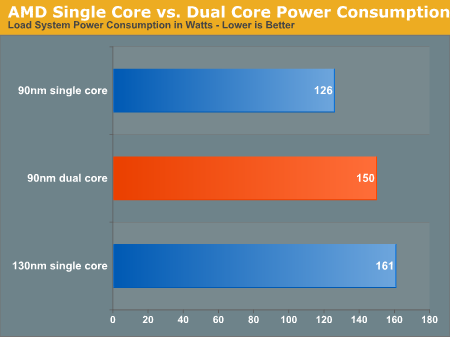AMD's Athlon 64 X2 4800+ & 4200+ Dual Core Performance Preview
by Anand Lal Shimpi on May 9, 2005 12:02 AM EST- Posted in
- CPUs
Power Consumption: Athlon 64 vs. Athlon 64 X2
In Part II of our preview of Intel's dual core processors, we noted that the addition of a second CPU core generally didn't increase overall system power consumption by that much. In fact, the Pentium D 2.8GHz vs. single core 2.8GHz comparison yielded only a 15% increase in system power consumption under load for the dual core CPU. While we didn't look at power consumption in our dual core Opteron review, armed with desktop parts, we were ready to look at how desktop power consumption was affected by the move to dual core.Single core AMD CPUs have always consumed less power than single core Intel chips; in fact, the 130nm Athlon 64 FX-55 consumes less power than a 3.0GHz Pentium 4 (5xx or 6xx series).
How much more power would a dual core Athlon 64 X2 consume? To answer this question, we looked at three CPUs on the same platform and measured system power consumption. We used a 130nm Athlon 64, a 90nm Athlon 64 and a 90nm dual core Athlon 64 X2 - all clocked at the same frequency and with the same per-core cache sizes. The results are below:


If you're worried about the Athlon 64 X2 generating too much heat, there's no reason to be concerned - if you're happy with the heat levels of your current 130nm Athlon 64, the X2 will run even cooler.










109 Comments
View All Comments
Viditor - Monday, May 9, 2005 - link
AnandConsider that an open invitation for dinner and drinks at The Rocks in Sydney Harbour.
Ya know, Computex Taipei is coming up at the end of this month...and those circle pacific fares aren't THAT expensive... ;-)
nserra - Monday, May 9, 2005 - link
I was looking at the transistor count of both AMD and Intel implementations of dual core and the look almost the same, despite intel uses 300mm vs amd 200mm. But my point is amd have ondie memory controler and intel Hyperthreading, all in all the processors “look” the same? Could i say this? (5% die for HT vs 5% die for Memory controller)Of course Amd have a better design since it drains less power and offers better performance.
Jeff7181 - Monday, May 9, 2005 - link
We're definately interested in some preliminary overclocking results... well... I am anyway.Anand Lal Shimpi - Monday, May 9, 2005 - link
SamusSorry about that, it's not intentional. I haven't published any overclocking tests for one major reason: the CPUs are still far away from being widely available; I don't want to give anyone the wrong idea based on the overclocking results of these early samples.
If you guys are interested, I can publish some preliminary findings here however.
Take care,
Anand
Anand Lal Shimpi - Monday, May 9, 2005 - link
ViditorIf I ever manage to get some time off, both Vinney and I would love to head down to Australia :)
Murst
If the differences are negligible (around 3% or less) then I'd say that's due to normal variances in the benchmarks - at a quick glance, that's what the majority of single threaded benchmarks are showing. There are other situations where the scheduler may confuse the picture a bit, but for the most part I'm not seeing any evidence of that in these tests.
tagger123
I used 32-bit Windows XP Pro. At this stage the 64-bit version of Windows is pretty much useless for the desktop unless you've got some very specific 64-bit desktop apps that you're using.
Take care,
Anand
Samus - Monday, May 9, 2005 - link
Anand,Why are you continuing to neglect our questions regarding overclocking? Is there an NDA or something disallowing you to discuss the topic?
-Tim
Murst - Monday, May 9, 2005 - link
So, is there any explanation why, in many tests, the single core 2.4 w/ 1mb cache is significantly faster than then dual core 2.4 w/ 1mb per core?That just doesn't seem to make any sense. Seems like the design of the dual core is not as great as everyone was saying if it slows down applications by that much.
It just seems like there shouldn't be a performance hit by adding another core with AMD's implementation, but there obviously is.
Viditor - Monday, May 9, 2005 - link
tagger123 - as most (if not all) of the apps are 32bit only, I would guess it was standard XP...tagger123 - Monday, May 9, 2005 - link
hi AnandWould like to know if you used windows xp or xp64 and if so - would it have any performance hit or increase on amd 64 x2
Viditor - Monday, May 9, 2005 - link
"you going to hire anand as a consultant?"Nope...but I'll buy the first round if he and his lady ever hit Sydney...! :-)